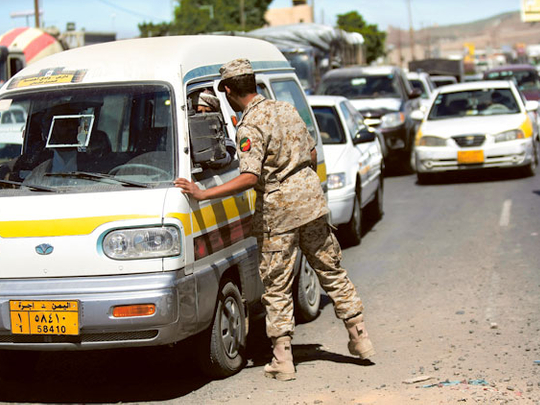
Sana’a: A ceasefire between Yemeni Al Houthis and Salafist fighters intended to end days of clashes that have killed at least 100 combatants and civilians appeared to be crumbling on Monday after Salafists reported a resumption of fighting.
“The Al Houthis are shelling Damaj now with mortars causing five injuries,” Salafist spokesman Surour Al Wadi’i said. “The ceasefire has not taken hold so far.”
A Red Cross delegation had managed to enter the town of Damaj to treat and evacuate those wounded in the fighting, but a translator with the team was shot and killed, he said.
The ceasefire had been announced for Monday by the UN envoy to Yemen, Jamal Benomar, according to the state news agency.
“We hope that there will be a permanent ceasefire and that the problem will be solved for good,” Benomar said.
Sectarian rivalry between Sunni Salafists and Shiite Al Houthis in Damaj has cast a shadow over reconciliation efforts in Yemen.
The clashes in Damaj broke out on Wednesday when Al Houthi fighters, who control much of the border province of Saada, accused their Salafist rivals of recruiting thousands of foreign fighters to attack them.
The Salafists say the foreigners are students who travel from abroad to study Islamic theology at Dar Al Hadith academy.
“There were massive Al Houthi attacks throughout the night against Dar Al Hadith academy and student dormitories,” said Al Wadi’i. “The death toll has risen to at least 100.” The figure cited was for Salafists killed in the clashes. The Al Houthis have issued no figures for casualties on their side.
Al Wadi’i also said a Red Cross delegation managed to enter Damaj on Monday in a convoy of four vehicles, only to come under fire from Al Houthi snipers who shot and killed a local translator with the delegation.
The ICRC could not immediately be reached for comment.
ICRC, however, issued a statement saying it had evacuated 23 of the most critically wounded people and delivered medical supplies delayed for several days. The wounded were moved to Saada airport by road before they were airlifted to Sana’a.
“There are still more wounded people in need of treatment, and we hope to be able to come back for them,” said Cedric Schweizer, head of the ICRC delegation in Sana’a.
The fighting has caused concern among world powers that helped ease long-ruling President Ali Abdullah Saleh from power in 2011 after months of protests. The ambassadors of the five permanent members of the UN Security Council and the Gulf Cooperation Council called for an end to the fighting.
“The ambassadors notice the amassing of troops outside the area which will exacerbate tensions and risk more violence,” they said in a joint statement.
Benomar said President Abd Rabbo Mansour Hadi had sent a plane to evacuate seriously wounded people from Damaj to Sana’a.
On Sunday, Yehia Abu Esbaa, head of a presidential committee trying to end the fighting, said Al Houthi fighters had reneged on a previous promise to stop attacks after a prisoner release.
The Al Houthis blockaded Damaj for weeks last year, accusing the Salafists of stockpiling weapons, a charge they deny.
Saada province is the base for a long-running Al Houthi rebellion against the government. Complaining of social, religious and economic discrimination in Yemen, the Al Houthis fought several battles with government forces between 2004 and 2010, when a truce was announced.












